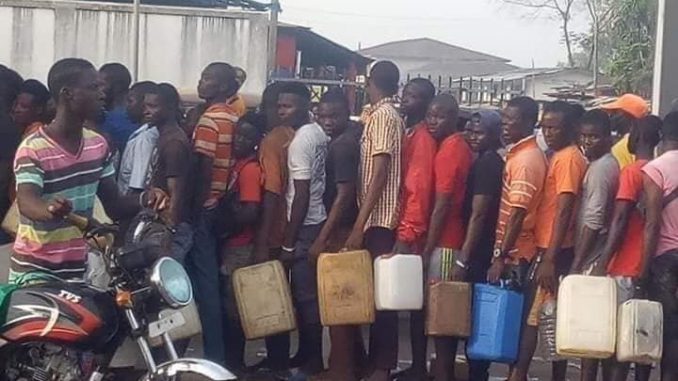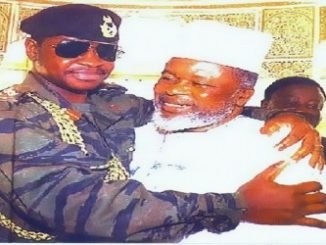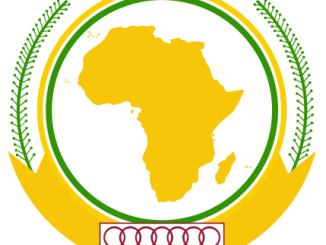
A shortage of fuel that grew more serious by the day has affected neighboring Liberia for three weeks now, virtually crippling vehicular movement in the capital Monrovia and other towns. Liberians have gone on social media to denounce the government of President George Weah for the fuel scarcity in the country.
The Liberia Petroleum Refinery Company ( LPRC ) has been trying to assure the nation : “The Liberian government through the LPRC is informing the Liberian people; our valid consumers and the general public that we are doing everything to resolve this unfortunate crisis that our beloved country and people are currently experiencing. The supply of petroleum products, mainly gasoline will be stabilized shortly; therefore, we are appealing to our citizens, our valued customers and the general public to continue to exercise the patience they have exhibited during these challenging times.”
The Liberia Ministry of Information also put out the following : “The Government of Liberia empathizes with the public for the difficulty they have had to go through over the last couple of weeks in obtaining petroleum products from stations across the country. Due to the shortage of gasoline, in many instances, people are made to stand in long queues for several hours before getting served,”
Additionally, Information Minister, Eugene Nagbe said :
The government now, we are working with some of the importers so that as early as within the next 24 to 48 hours maximum, we can have emergency gasoline come into the country. We are using various sources – I’m saying working with importers because the government traditionally is not the one to import fuel into the country. So, some of our neighboring countries, have partnerships with some of the importers here – so we are using that route. We are also using other countries that are closed by to bring fuel – on an emergency basis.”
Despite these assurances to the Liberian people, the situation did not improve. The crisis is said to be the result of dredging going on presently at the Freeport of Liberia, which has made it impossible for ships bearing fuel t o dock at the quay.
As good neighbors, Sierra Leone, though saddled with her own problems, has decided to come to the rescue of a sister nation. About 20 tanker trucks from Liberia are reportedly heading for Sierra Leone to procure fuel to ameliorate the scarcity in Liberia . It is reported by some of Liberia’s media that other West African countries like Guinea and Senegal have also decided to come to Liberia’s rescue.
LIBERIANS QUEUING FOR FUEL

Dry petrol filling stations leave thousands trooping
MONROVIA — Liberians have faced long queues at petrol pumps for nearly two weeks as sloppy bookkeeping and poor port infrastructure have triggered economically damaging fuel shortages.
Incorrect fuel-reserve figures in the impoverished west African country partly led to the shortage, which has dragged on since late January, an industry official said.
But an undredged port in the capital Monrovia has also prevented large fuel tankers from docking, according to port and government officials.
Liberia’s Commerce Minister Wilson Tarpeh told AFP the shortage has caused an “economic downtrend”, without giving precise figures.
Consumers are spending less on household items as fuel prices rise, he said, and businesses are operating under capacity.
Liberia suffers frequent fuel shortages, but the current one has lasted an unusually long time. Queues forming before dawn at petrol stations are now commonplace, and scarcity has forced taxis and buses to hike fares.
“I have been here since 5am but until now I am yet to receive gasoline,” said Victor Gray, 45, at a Monrovia petrol station at 8am this week.
“I think the kids will miss class today,” he added, exhausted after he and his children slept in the car.
The shortage is another blow to President George Weah, who is under increasing pressure to improve living conditions in the country of some 4.8 million people.
He inherited an economy already devastated by back-to-back civil wars from 1989 to 2003, and by the 2014-2016 west Africa Ebola outbreak.
Inflation is now running at about 30 per cent, according to the World Bank, which has incited anger and protests.
Compounding economic difficulties, fuel scarcity means it is harder to move goods around the country.
“My store is empty,” said Anthony Kai, who sells dried goods in the town of Zwedru, some 550 kilometres east of Monrovia.
“Very soon the population will lack the necessary things they need,” he added.
Fuel distributors which overstated their reserves are also partly to blame for the shortage, according to an official from the Liberia Petroleum Refinery Company (LPRC) who requested anonymity.
The LPRC is a state-owned company charged with ensuring a consistent oil supply.
The greater problem, officials say, is that large petrol tankers have been unable to dock in the port of Monrovia for weeks because of unusually shallow waters.
Silt and detritus have accumulated in the port since summer, when heavy rains prevented crews from dredging, said the managing director of the National Port Authority, Bill Tweahway.
Ships with a draft of more than 10 metres can no longer enter the port, Tweahway said, although smaller ones can still dock, which has averted a crisis.
The government said it would start dredging, after which ships with a draft of over 13 metres would be able to dock.
Losses and frustration
Liberia is also expanding the port so that more than one vessel can dock at a time, Weah’s office told AFP, pointing to the port as the main cause of the fuel shortage.
An importer who declined to be named said that businesses are losing “a huge amount of money” chartering several smaller ships rather than one freighter.
But a foreign official in Monrovia, who declined to be named, said the smaller ships meant that some petrol was still arriving.
“I don’t think this is an existential crisis, just a screw-up,” he said.
Everyday frustration is nonetheless rife.
Civil servant Emmanuel Gaye said he would not be able to afford his fare to work if the fuel shortage lasts another week, since it has doubled.
“We can’t continue like this,” said Solomon Fayah, a driver, sitting in a fuel queue in Monrovia.






